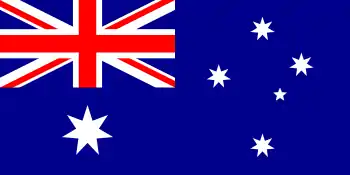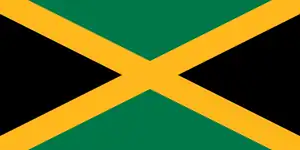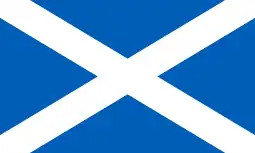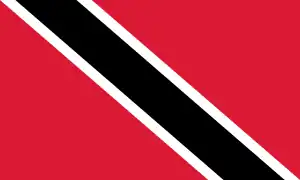 | |
| Host city | Kingston |
|---|---|
| Country | Jamaica |
| Nations | 10 |
| Athletes | 94 (72 Men/22 Women) |
| Sport | 10 |
| Events | 120 |
| Opening | 14 August 1966 |
| Closing | 20 August 1966 |
| Opened by | Prince Philip |
| Athlete's Oath | Derven Long (Jamaican Team Captain) |
| Main venue | Polio Rehabilitation Centre, Mona |
The second Commonwealth Paraplegic Games were held in Kingston, Jamaica from 14 to 20 August 1966. There were 133 athletes from 10 countries.[1][2] The Games were opened by Prince Philip.
Participating nations
The following nations participated at the games:[3]
 Australia
Australia.svg.png.webp) Canada
Canada England
England.svg.png.webp) Fiji
Fiji Jamaica
Jamaica New Zealand
New Zealand.svg.png.webp) Northern Ireland
Northern Ireland Scotland
Scotland Trinidad and Tobago
Trinidad and Tobago Wales
Wales
Sports
Sports on the program included:[2][4]
- Archery
- Athletics
- Dartchery
- Pentathlon (Archery, Athletics & Swimming Events)
- Snooker
- Swimming
- Table Tennis
- Weightlifting (Men Only)
- Wheelchair Basketball (Men Only)
- Wheelchair Fencing
Venues
| Venue | Sport |
|---|---|
| University of the West Indies Sports Field | Archery, Dartchery, Field Events |
| Recreation Hall, Games Village, Mona | Weightlifting, Wheelchair Fencing |
| St. Andrews Club | Snooker |
| University of the West Indies Pool | Swimming |
| University of the West Indies Gym | Wheelchair Basketball |
| Old Library, Games Village, Mona | Table Tennis |
| National Stadium | Slalom, Wheelchair Races |
Performance
Australia
The Australian team included 8 men and 3 women.[2] Ten members of the team had competed at the 1962 Games and come away with gold medals, but the total delegation was smaller than in 1962 owing to a lack of funds.[2]
The only newcomer to the Australian team was John Martin. He competed in four sports, para-athletics, para-swimming, wheelchair basketball and table tennis.[2] Martin won silver in the men's 50 yard freestyle Class C event.[4]
Lorraine Dodd was Australia's only female competitor from Western Australia on the team. Going to the Games to compete in swimming, Dodd did not feel she had gotten in enough training.[5]
Daphne Ceeney was another member of the Australian delegation, winning gold in wheelchair fencing.[6][4] Ceeney set a world record in the women's 50 m freestyle Class D event in a Games record time of 45.6 seconds.[4]
The Australian delegation included Mikko Tamminen, who won 5 medals at the Games. His gold medals were in shot put and middleweight weightlifting. His silvers were in the javelin and club throw. His sole bronze medal came in the discus. The Finnish born competitor immigrated to Australia in 1951 and was injured in an accident in 1957. He died a year after the 1966 Games took place.[7]
Vic Renalson came away from the Games with 2 golds, 2 silver and 1 bronze. He competed in para-athletics in Kingston.[8] Following the Games, he started to get involved with athletics coaching.[8]
The team manager was Kevin Betts.[2]
England
The English team included swimmer Sue Masham. She won silver in the women's 25 m breaststroke class A event. It also included swimmer Margaret Gibbs, who finished second in the women's 50 m freestyle Class D event.[4]
Jamaica
The delegation from Jamaica included Octavius Morgan, who set a world record in the men's 50 yard freestyle Class C event in a time of 53.7 seconds.[4]
New Zealand
New Zealand also participated in these Games. Their team manager was Max Steward. They had a better funding situation than their Australian competitors, but some team members withdrew early because of medical issues. The team included 1962 Games gold medalist Auckland's Pompey Heremaia. Heremaia competed in the precision javelin, snooker, shot put, club throw and wheelchair fencing.[2] Heremaia was New Zealand's sole representative at the 1962 Games; here he won medals in snooker and javelin.[9]
Scotland
The Scottish team included Ruth Harvey, who claimed silver in women's wheelchair fencing.[6]
Overall performance
England and Jamaica were leaders for medals in the pool. They had 3 gold medals each. Australia followed closely behind with 2. Scotland was the only other country with gold in the pool with one.[4] World and other records fell in the pool. One was set by Lorraine Dodd in the women's 25 m breaststroke class A event, where she posted a world record time of 32.0 seconds.[4]
Final medal table
England, Australia and Scotland were the top three nations.[10]
| Nations | Gold | Silver | Bronze |
|---|---|---|---|
| 64 | 50 | 30 | |
| 33 | 28 | 22 | |
| 11 | 11 | 21 | |
| 8 | 8 | 5 | |
| 2 | 3 | 2 | |
| 1 | 8 | 2 | |
| 1 | 0 | 0 | |
| 0 | 5 | 3 | |
| 0 | 1 | 0 | |
| 0 | 0 | 1 | |
| 120 | 114 | 86 |
See also
References
- ↑ "Premier to open games for invalids". Glasgow Herald. 11 April 1970. Retrieved 20 February 2012.
- 1 2 3 4 5 6 7 "Paraplegic games under way". Canberra Times. 16 August 1966. p. 21. Retrieved 7 June 2017.
- ↑ "The Second Commonwealth Paraplegic Games – Kingston, Jamaica 1966". paralympicanorak. 30 January 2013. Retrieved 31 August 2017.
- 1 2 3 4 5 6 7 8 "Australia scores twice". Canberra Times. 17 August 1966. p. 30. Retrieved 7 June 2017.
- ↑ "The camera catches the action". Canberra Times. 14 June 1966. p. 16. Retrieved 7 June 2017.
- 1 2 "WOMAN FENCER WINS". Canberra Times. 18 August 1966. p. 28. Retrieved 7 June 2017.
- ↑ "Paraplegic Olympian dead". Canberra Times. 13 January 1967. p. 16. Retrieved 7 June 2017.
- 1 2 "Visitors enter in athletic carnival". Canberra Times. 1 October 1966. p. 27. Retrieved 7 June 2017.
- ↑ "Pompey Heremaia at the Perth Games, 1962". Te Ara: The Encyclopedia of New Zealand. Retrieved 7 June 2017.
- ↑ "The Second Commonwealth Paraplegic Games – Kingston, Jamaica 1966". paralympicanorak. 30 January 2013. Retrieved 31 August 2017.